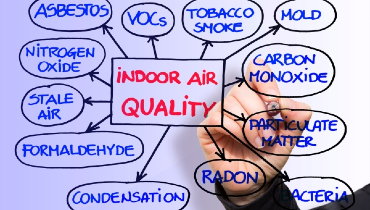What Air Quality Tests Measure

Air quality tests empower homeowners to evaluate the safety of the air their family breathes every day. Not all home air quality tests are created equal, though. Professional testing can identify elevated levels of allergens, mold, radon, and other harmful compounds.
Read on and learn more about the benefits of evaluating your home’s air quality on a regular basis.
What Is an Air Quality Test?
Air quality tests rely on samples taken in your home. The results of these tests can identify dozens of airborne contaminants, which are broadly divided into three main categories:
-
Biological pollutants
-
Chemical compounds (also known as volatile organic compounds)
-
Combustion pollutants
What does an air quality test show? Your results will evaluate the presence of the following contaminants and determine if levels of pollutants are unsafe.
Airborne Biological Pollutants
Biological contaminants include any particulates produced by living organisms in your home. This category of contaminants can include disease-causing bacteria and viruses as well as airborne irritants like dust, dander, and pet hair.
Chemical Compounds
Also referred to as volatile organic compounds, or VOCs, chemical compounds are non-organic materials found in household cleaning products, carpets, furniture, and other items. VOCs are often found in building materials like treated wood and can leak into the home. Other VOCs, like radon, may be naturally occurring.
Combustion Pollutants
In most cases, this category of airborne pollutants includes any by-product of burning any type of fuel, like the natural gas that powers a stovetop. Smoke, fluorocarbons, and carbon monoxide produced by heating systems, fireplaces, or smoking cigarettes indoors can have negative long-term health effects and cause immediate irritation.
Related Topic:Sources of Indoor Air Pollution | What Is Indoor Air Pollution
How Is an Air Quality Test Performed?
Air quality tests aren’t one-size-fits-all. In most cases, your home will need to undergo a small number of tests designed to detect specific contaminants. Choosing the right tests for your home will be based on several factors, including the symptoms you’re experiencing and potential risk factors.
Depending on the compounds your home may be at risk for, the service professionals at your local Aire Serv will test:
- Dust samples
- Paint samples
- Air samples
For example, many radon test kits rely on exposure to air for 48 to 96 hours.
Your local Aire Serve can help you determine which tests are the most beneficial for your home and professionally perform those tests as a part of our indoor air quality testing services.
How Often Should I Test My Home Air Quality?
Home air quality is constantly changing due to seasonal weather conditions, chemicals introduced through routine cooking, cleaning, and renovations, pollutants lingering from leaks, flooding or natural disasters, and plenty more. Therefore, testing home air quality every 3-5 years or so is a good idea for many homeowners, especially those dealing with allergies or other respiratory health concerns. Testing is also suggested if you’ve been experiencing symptoms of airborne irritants or contamination.
The most common signs of poor indoor air quality include:
- Headache
- Sore throat
- Sneezing
- Fatigue
- Irritability
If these symptoms last for several weeks or if symptoms recede when you’re away from home, have your home assessed immediately.
Related Topic:How to Test Air Quality in Your Home
Reduce Pollutants—Get Professional Indoor Air Quality Testing
Homeowners experiencing the telltale symptoms of airborne contamination can take proactive steps to identify possible pollutants, remediate the situation, and schedule ongoing monitoring. To get the professional air quality testing you need to protect you and your family, trust your local, and knowledgeable Aire Serv experts. Call us today or schedule an appointment today.
 Click to call
Click to call


